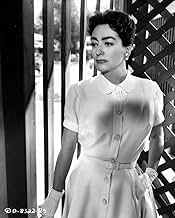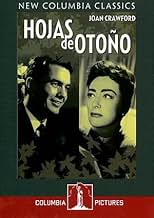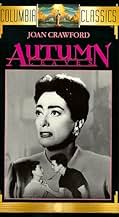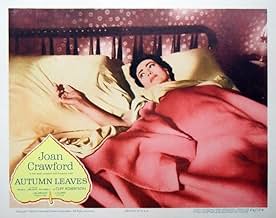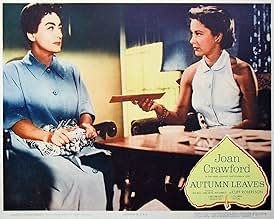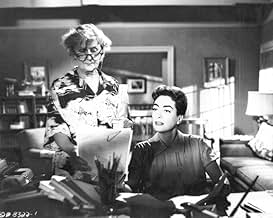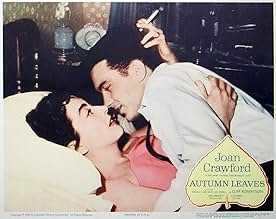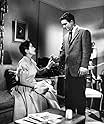Adicionar um enredo no seu idiomaA lonely middle-aged woman meets a younger man, but their relationship is threatened after the man's troubled past reveals itself.A lonely middle-aged woman meets a younger man, but their relationship is threatened after the man's troubled past reveals itself.A lonely middle-aged woman meets a younger man, but their relationship is threatened after the man's troubled past reveals itself.
- Direção
- Roteiristas
- Artistas
- Prêmios
- 1 vitória no total
- Mexican Vendor
- (não creditado)
- Concert Attendee
- (não creditado)
- Butcher
- (não creditado)
- Mr. Magoo
- (sonoplastia)
- (não creditado)
- Minor Role
- (não creditado)
Avaliações em destaque
'Autumn Leaves' is not going to connect with everybody, am aware that some respected critics and fellow prolific reviewers didn't care for the film. For me though, it was very good and a near-must see for anybody that likes Crawford, Robertson and Aldrich. Can totally see why Crawford herself thought highly of the film and her reasoning mirrors my feelings on it (also agree with her that it should be better known), and to me it is among Aldrich's better films if not quite in the same league as the likes of 'Whatever Happened to Baby Jane' and 'Attack'.
It is not a perfect film. With my biggest reservation being the ending, which for me and some others was too abrupt and tonally was completely at odds with what came before. For a quite dark story to end on such a jarringly pat note was a shame.
Maybe the film is a little too long as well.
Crawford on the other hand is in a role that she was born to play and pulls out all the way. Robertson gives a very distinguished turn in a not easy role to play and actually appreciated that he doesn't go over the top, a big trap for a character that changes as much as he does here. He works very well together with Crawford and personally didn't think that they were too much of a mismatch together in age and acting style and that their styles of acting didn't clash too much, actually thought that the more understand acting of Robertson contrasted well with Crawford's. Lorne Green and particularly Vera Miles are very good in support and Aldrich directs beautifully with material that he is completely at ease with, thematically this is already classic Aldrich.
Visually, 'Autumn Leaves' is handsomely mounted and photographed with a real sense of atmosphere. The music is haunting and sears in intensity, without intruding too much. The script is soap opera but intelligently written and naturally flowing soap opera that doesn't get too overwrought or heavy-handed. The story deserved a much better ending, but the psychological aspect is hard-hitting and pulls no punches (regardless of any debate on how well it has dated) and it is very intense and moving.
On the whole, very good with a lot of things that come off greatly. 8/10
One might reasonably ponder if the drama doesn't become too intense for its own good, becoming overbearing and melodramatic as the third act slowly rolls around. Even within the last ten minutes, through to the ending, there are times when it seems like the movie has a hard time finding exactly the right tone. As great as this is at its best, I can't say it's 100% perfect. Even at its most difficult, though, the proceedings are tremendously compelling, tragic and heartrending but also endearing. And everything about this film is marvelous, each part in and of itself making a bigger impression than I ever anticipated from the outset, bent toward amplifying the torrent of emotions on hand, and working in concert to complement one another. Aldrich is all but brilliant in orchestrating scenes, imbuing even some specific shots with outstanding personality, though his task is made easier by an exceptional cast that reaches deep to give sharp, complex performances on down the line. Crawford, Robertson, Vera Miles and Lorne Greene, Sheppard Strudwick - no matter the size of the part of the nature of the role, from one to the next every actor is terrific, and I adore them all. Hans J. Salter's original score lends powerful ambience to the course of events, and Charles Lang's cinematography is just as vivid as Aldrich's direction. Production design, art direction, hair and makeup, Michael Luciano's editing, and more are all fantastic.
And still none of this would be possible without tight writing, but Rouverol, Meltzer, and Blees have indeed done a fine job. The dialogue is vibrant, and the characters come off as very real and complicated. The tale at large is relatively small, concise and specific, yet in both its lighter facets and in its more tense, harrowing aspects there's a measure of universality in the telling that makes the plot terribly engrossing. And along with all this, I must also point out the scene writing, which at select points is especially crucial to the impact that the film has. The "walk" that leads to an injury is almost excruciating for the turns that are taken in the span of a few minutes; a later moment in which certain sounds trouble Milly emphatically recalls one of the most resonant, haunting moments from all six seasons of 'Breaking bad,' and took my breath away. As if all this weren't enough, I must also compliment the writing team, and all involved, for delicate handling of subject matter that even today is often managed poorly in cinema; for the 1950s, 'Autumn leaves' feels well ahead of its time. There is no judgment, no condescension, and no prejudice or persecution, except from those who are clearly awful people. The feature tries very hard to be balanced and considerate, presenting such a condition in a way that serves up the intended drama for storytelling while very pointedly never losing sight of the character's humanity. I'm in no position to offer absolute judgment, but I'm inclined to think the movie has a definite leg up on many others in this matter.
I can safely say I didn't know anything about this before I sat for it, save for the involvement of the chief stars. I'm so pleased with what this feature actually is. From the blithely pleasant first length, to the dire, heavy turns to follow, this is overall exceedingly well-rounded and thoughtful, and crafted with care and intelligence. There might be instances when the saga doesn't meet with total, pure success, yet these are fleeting and minor in comparison to the wonderfully robust viewing experience it otherwise represents. Everyone in front of the camera and behind it turned in stupendous work to make this just about the very best picture it could be, and the result is unquestionably enjoyable as a movie-goer, satisfying, and rewarding. I suppose a content warning may be necessary for those with particular sensitivity to topics of mental illness, but beyond this 'Autumn leaves' is so very well done that as far as I'm concerned it earns a solid recommendation for all comers. If you have the opportunity to watch, this holds up quite well even decades later and is certainly worth checking out!
This is a hard film to characterize. It's definitely not a soaper, but it has aspects of that. It has romance, dealing with mental illness, and even elements of a thriller to it. It deals with the self-doubt we all have about the choices we have made in life. No high-camp Johnny Guitar is this film. Although, don't get me wrong, I love Joan in her campy 50's films too.
Cliff Robertson is almost at the bottom of the bill on this one, even though he really is the male lead. This is only his second film, yet he pulls off the part of the child-like Burt like a pro. It's also good to see Ruth Donnelly as Milly's ever-supportive older neighbor twenty years after she was a contract player over at Warner Brothers. I highly recommend this film for anyone who even remotely enjoys Joan Crawford's films. You don't have to be a big fan to appreciate this one.
Wow! I watched this on TV on a lark - the movie had a "To Be Announced" and no description, so I didn't know what to expect; I didn't know the story line. My only previous experience with Joan Crawford as an actress was "Baby Jane", and I really don't know much about her.
This was an unexpected treat - the acting throughout is superb, and since it is B&W, the use of dramatic lighting and use of unusual camera angles adds depth and drama to the story.
When Millicent begins to realize that Burt is a pathological liar, it made me want to say, "Run, girl, RUN!". But then, the villains appear on the scene (Vera Miles and Lorne Greene), and the awful truth is revealed. (BTW, I only knew Greene as Ben Cartwright, but when he was younger, he was HOT! And, that VOICE! But, I digress...). One of the best lines - that made me laugh out loud - that other viewers have mentioned, "And YOU....you SLUT!" - is so good because of how Crawford delivers it. Such dignity.
It is a true phenomenon that when a mind is faced with an unspeakable trauma, the creation of a 'fantasy life' can be created to make the trauma more "manageable". Burt's breakdown is understandable, but the horrific truth of how most psycho-therapy was conducted back in the day (drugs and electro-shock therapy) makes the sanitarium scenes difficult to watch.
But...the deep strength of Millicent is the true face of love. To love another so much that she wanted Burt to have a happy future, even if it didn't include her, is what this reviewer sees as the very heart of love. Although actors are trained to portray a wide range of characters and emotions, I believe that a woman must be truly strong to be able to portray Millicent - and that gives one insight as to Joan Crawford's own character.
And, how does it end? That is for you to find out. Watch it - it's gripping, entertaining, engaging - and the kind of movie you can watch with someone special. And, watching how they respond to this movie will give YOU some insights!
Você sabia?
- CuriosidadesIn an interview for a much later documentary on Joan Crawford, Cliff Robertson recounts his first meeting with her, at her house. Already somewhat intimidated by working with the legendary Crawford, he is let in, then hears her call from poolside, where she's sunning, "Come on out, dear boy. We've been waiting for you." Robertson has nothing but admiration for Crawford's talent and incredible technical discipline. At one point, Director Robert Aldrich wanted Crawford to cry, but only slightly - a tear or two. "Which eye?" Robertson recalls Crawford asking. Then repeats the anecdote, amazed, "'Which EYE?'"
- Citações
Virginia: Sure, he should be committed!
Milly: Of course, you'd want me to commit him, get him out of your life, put him away permanently someplace where he can never again remind either one of you of your horrible guilt; how you and you had committed the ugliest of all possible sins, so ugly that it drove him into the state he's in now!
Mr. Hanson: What kind of a woman are you to be satisfied with only half a man? There must be so...
Milly: Even when he doesn't know what he's doing, he's a saner man than you are! He's decent and proud. Can you say the same for yourselves? Where's your decency? In what garbage dump, Mr. Hanson? And where's yours, you tramp?
Mr. Hanson: I don't have to listen to that!
Virginia: She's the one who's crazy!
Mr. Hanson: She has to be crazy to put up with that weakling!
Milly: You, his loving, doting fraud of a father! And you, you SLUT! You're both so consumed with evil, so ROTTEN! Your filthy souls are too evil for Hell itself!
- Cenas durante ou pós-créditosOpening credits are shown over a background of...... leaves.
- ConexõesFeatured in Joan Crawford: Always the Star (1996)
- Trilhas sonorasAutumn Leaves
(Les Feuilles Mortes)
Music by Joseph Kosma
French lyrics by Jacques Prévert
English lyrics by Johnny Mercer
Performed by Nat 'King' Cole
Principais escolhas
Detalhes
- Tempo de duração
- 1 h 47 min(107 min)
- Cor
- Proporção
- 1.85 : 1

